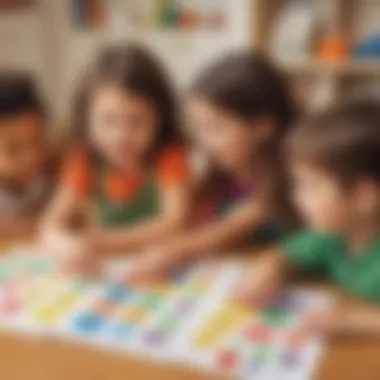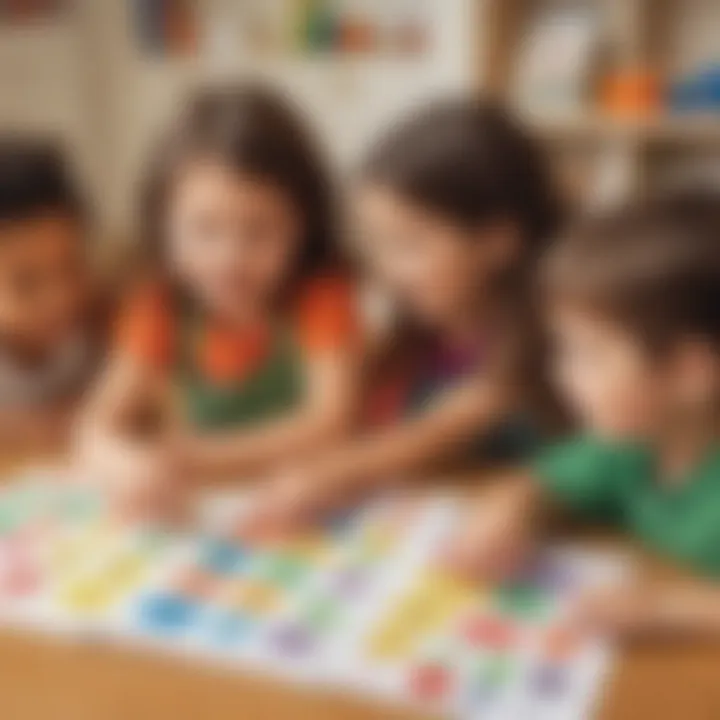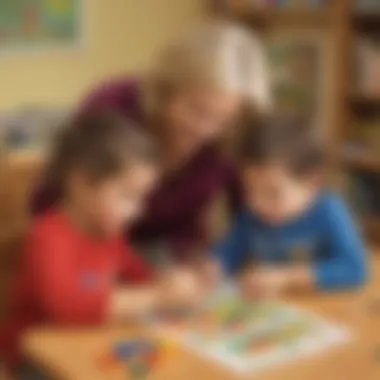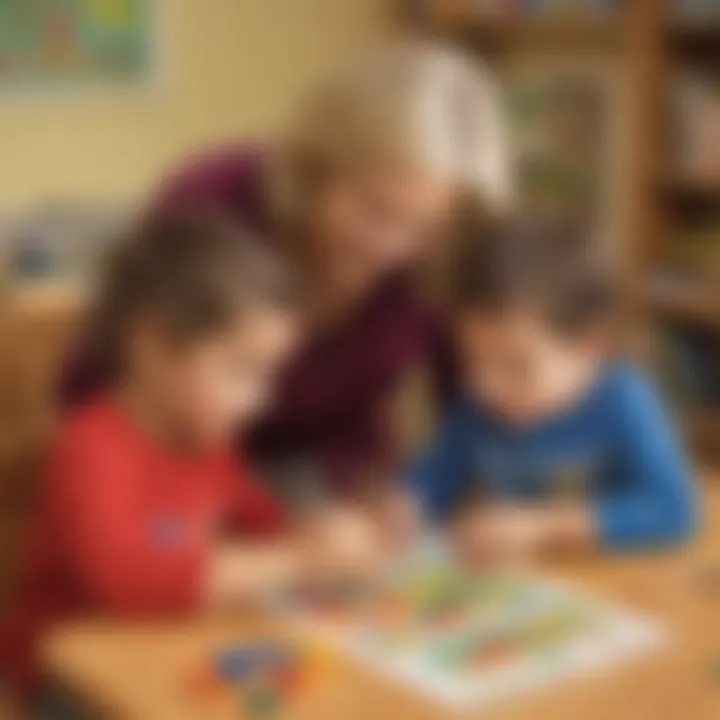Understanding Pre-K Learning Numbers: A Comprehensive Guide


Intro
Understanding how children learn numbers in pre-kindergarten is essential. This stage is critical for building a foundation in mathematics. Engaging children through innovative methods and activities can foster an environment conducive to learning. The significance of numbers in everyday life is immense, and introducing these concepts playfully can have a lasting impact.
Creative Activities
Developing numerical skills requires creativity and fun. Engaging activities motivate children to learn while keeping their interest levels high.
Craft Ideas
Simple craft ideas can be a great starting point. For example, children can create number collages using diverse materials such as colored paper, markers, and stickers. It allows them to explore numbers visually and tactilely. Another option is making number cards using recycled materials, where children can practice writing the numbers or associating them with objects around them.
Step-by-Step Guides
- Number Collage:
- DIY Number Cards:
- Gather materials like old magazines, glue, and scissors.
- Ask the children to choose a number.
- Have them cut out pictures that represent that number, such as three apples.
- Glue these pictures onto a piece of paper, and encourage them to write the number next to it.
- Collect old cardboard or cardstock.
- Help the children cut them into small rectangular cards.
- Demonstrate writing numbers on the cards.
- Children can decorate them and practice number recognition with a family member later.
Educational Value
Engaging in craft activities not only enhances fine motor skill development but also reinforces numerical recognition. The hands-on experience helps children associate numbers with shapes and forms, making learning more interactive.
Fun Quizzes
Quizzes can solidify children’s understanding of numbers. Well-structured quizzes provide an avenue for review.
Quiz Topics
The quizzes cover fundamental concepts like counting, number sequences, and simple addition. These topics help reinforce their recognition of numbers in various contexts.
Question Types
Different question formats keep children engaged. Multiple-choice questions, true or false statements, and short answer formats ensure a comprehensive understanding of concepts. This variety maintains interest and excitement in the learning process.
Knowledge Reinforcement
Quizzes serve as immediate feedback for children. They learn what they know and identify areas for improvement. This reflection approach helps adapt future learning strategies. Children gain confidence by successfully answering questions.
Fact-Based Articles
Reading broadens children's understanding of numbers and how they apply in real life. Articles offer structured information that children can understand.
Topics
Articles delve into various topics, such as basic arithmetic operations, shapes, and patterns. Each topic provides a thematic exploration of numbers.
Engaging Content
Presenting information in an engaging manner makes it easier for children to grasp concepts. Using relatable examples and illustrations can support comprehension and interest.
Prolusion to Pre-K Learning Numbers
Number recognition forms a fundamental part of early childhood education. It sets the stage for future mathematical learning, making it essential for young learners. The development of numerical skills provides children with the tools they need to understand not just math, but also the world around them. When children can recognize numbers, they can easily engage in everyday tasks, such as counting objects and making simple calculations.
Importance of Number Recognition
Number recognition is crucial for several reasons. First, it builds a foundation for deeper mathematical concepts. When children recognize numbers, they can progress to more complex topics like addition, subtraction, and even basic geometry. This progression is especially significant as it aids in their academic achievement later in school.
Second, number recognition helps develop critical thinking skills. Kids who become comfortable with numbers are better equipped to solve problems and make thoughtful decisions. This skill not only applies to math but also enhances their overall cognitive development.
Moreover, it promotes confidence. When children can say or write numbers correctly, they feel that they are achieving something. This confidence can motivate them to explore more numerical concepts eagerly.


In addition, early number recognition contributes to lifelong skills. The ability to manage money, tell time, and measure things are all based on number sense. Therefore, establishing this foundation in pre-kindergarten is not just beneficial but essential for their future.
Developmental Milestones in Numerical Understanding
Understanding numbers is not just about memorizing their symbols. There are specific developmental milestones that indicate when children are ready to learn about numbers.
- Age 2 to 3: At this stage, many children start to recognize and name some numbers. They often enjoy counting during playtime, though they may not fully understand the concept yet.
- Age 3 to 4: Children will begin to associate numbers with quantities. For example, they can understand that three blocks represent the numeral “3.” During this period, they might also start to write some numbers.
- Age 4 to 5: By this age, most kids can count to ten and understand the concept of more versus less. They can engage in simple addition or subtraction using visual aids like fingers or blocks.
These milestones can help caregivers identify when their children are ready to advance to more complex number activities. Recognizing these stages is beneficial both for parents and educators. They can tailor learning experiences that align with each child’s development.
Summary
Understanding the significance of number recognition and developmental milestones sets a strong groundwork for pre-K learning. Early education focuses not just on rote learning but also encourages exploration and engagement with numbers. Recognizing these nuances helps contribute to a richer learning experience.
Cognitive Skills and Number Learning
Cognitive skills relate to how children think, learn, remember, and solve problems. These skills are vital as they form the foundation for number learning in pre-kindergarten. A child’s ability to recognize and work with numbers is closely tied to their cognitive development. Strong cognitive skills help young learners to better understand concepts like counting, addition, and subtraction.
Benefits of Strong Cognitive Skills for Number Learning
- Improved problem-solving abilities
- Enhanced memory skills
- Better reasoning and analytical thought
- Ability to make connections between concepts
Understanding numbers is not merely about memorizing facts; it requires a mental framework through which children can navigate numerical concepts. Thus, classes should emphasize cognitive skills alongside content knowledge. This creates a balanced learning environment where kids can flourish.
Relating Numbers to Daily Life
Connecting numbers to real-world situations is essential for young learners. When kids see numbers in action, they grasp their relevance. Activities such as counting toys, measuring ingredients for a recipe, or identifying numbers on houses encourage children to understand the use of numbers in everyday life.
Here are a few ways to help children relate numbers to daily scenarios:
- Counting Items: Count apples while shopping or toys at home.
- Cooking Together: Follow a recipe that needs measurement.
- Time Management: Use clocks to explain the time.
These activities not only reinforce numerical skills but also allow children to see that numbers have practical uses, enhancing their cognitive connection to these concepts.
Building Numerical Sense
Building numerical sense involves developing an intuitive understanding of numbers and their relationships. This process takes time and requires various activities that engage the mind.
Encouraging children to explore numbers in different ways can solidify their understanding. Strategies include:
- Using Manipulatives: Blocks or beads are effective in teaching counting and basic operations.
- Playing Number Games: Engage children with board games that focus on counting.
- Storytelling with Numbers: Create stories that involve numbers for comprehension.
Building numerical sense is critical because it lays a foundation for more complex mathematical concepts later in education. As children play and manipulate numbers, they develop a comfort and familiarity with numerical ideas.
Effective Teaching Strategies
Effective teaching strategies are crucial in helping pre-kindergarten children grasp the complexities of numerical understanding. These strategies not only enhance children's ability to recognize and use numbers in various situations but also prepare them for future mathematical learning. Effective teaching in this context is characterized by engaging methods that promote active participation. By tapping into children's natural curiosity and desire for exploration, educators can create an environment conducive to learning numbers.
Interactive and Experiential Learning
Interactive learning invites children to engage with numbers through hands-on activities. This type of learning is effective because it utilizes play, fostering a deeper understanding of numbers beyond rote memorization. For instance, children can practice counting by using everyday objects such as blocks, toys, or even snacks. When children physically manipulate items, they develop a concrete understanding of quantities.
Moreover, experiential learning allows for collaborative opportunities. Children learn better in social contexts, as they interact with peers, share ideas, and solve problems together. Activities can include group games that require counting, sorting, or simple math problems, encouraging teamwork and communication skills along with numerical understanding. This approach also caters to different learning styles, ensuring that every child can participate and learn effectively.
Incorporating Technology in Number Learning
Technology can play a significant role in enhancing number learning. Educational apps and online games designed for preschoolers can make learning numbers exciting and relatable. These tools offer interactive experiences that engage children in a manner traditional methods may not. They often use colorful graphics, fun characters, and varied activities that keep children focused.
However, balance is key. While technology can provide valuable support, it should be used in moderation and supplemented with hands-on learning. Parents and caregivers should guide children in using these tools effectively, ensuring they complement other learning methods. Useful resources include websites like Wikipedia and Britannica, which provide further insights into technology in education. By integrating technology into the learning process, educators can engage young learners in a dynamic way, paving the road for a lasting interest in numbers.
Play-Based Learning Activities
Play-based learning activities are essential for fostering number skills in pre-kindergarten children. These activities harness the natural curiosity of young learners and transform play into an invaluable educational tool. Engaging in play allows children to explore concepts in a hands-on manner, cultivating a deeper understanding of numbers while simultaneously nurturing other essential skills such as socialization, problem-solving, and critical thinking.


Importance of Play-Based Learning
Play is not merely a way to pass the time; it is a mode of learning in itself. Through play-based activities, children can freely manipulate objects and ideas. They engage with numbers in a context where they feel safe to experiment and make mistakes. This emerging understanding is vital, as it lays a solid foundation for future numerical skills and concepts. Emphasizing play avoids the pressures commonly associated with traditional learning, encouraging children to learn at their own pace.
Benefits of Play-Based Learning Activities
- Enhances Engagement: Children are more likely to engage deeply when they find the activity fun and interesting.
- Fosters Collaboration: Many games and activities involve teamwork, helping children develop social skills.
- Promotes Problem-Solving Skills: Engaging in activities that require them to think critically about how to use numbers helps children build logical reasoning.
- Encourages Creativity: Play often allows for creative expression, which can lead to innovative ways of understanding numbers.
Games and hands-on activities specifically designed around number skills serve to reinforce these concepts, creating an environment where learning is both effective and enjoyable.
Games that Reinforce Number Skills
Games are a fundamental aspect of play-based learning, particularly for teaching numbers. They provide a structured platform for children to understand numerical concepts while having fun. These games can range from traditional board games to digital apps designed for education.
Types of Games
- Board Games: Games like Chutes and Ladders or Number Bingo introduce children to counting and recognizing numbers in a social setting.
- Card Games: Simple card games can also engage children in number recognition and basic addition or subtraction.
- Outdoor Games: Activities like hopscotch or number scavenger hunts allow children to physically interact with numbers, enhancing their spatial awareness of numerical concepts.
Playing games allows children to practice skills repeatedly, reinforcing their knowledge in an engaging manner. Moreover, these games can be easily adapted to suit varying skill levels, ensuring all children are challenged but not overwhelmed.
Hands-On Activities for Young Learners
Hands-on activities are equally crucial in developing numerical skills. These activities involve direct manipulation of objects, providing tactile experiences that deepen understanding.
Examples of Hands-On Activities
- Counting Manipulatives: Using items like blocks, buttons, or stones, children can practice counting, addition, and subtraction by physically moving the objects.
- Sorting Games: Activities that involve sorting numbers or objects based on various criteria can enhance classification skills and number recognition.
- Measurement Activities: Simple exercises that involve measuring objects with rulers or tape measures can introduce children to the concept of numbers in real-life applications.
Through these hands-on experiences, children not only learn numbers but also develop fine motor skills and cognitive abilities. Importantly, they achieve learning outcomes in a playful way, which is more conducive to long-term retention of knowledge.
The connection between play and learning is profound. When children play, they engage deeply, fostering a natural curiosity that drives their learning.
Overall, the use of play-based learning activities, including both games that reinforce number skills and hands-on activities, is crucial for building a strong foundation in numerical understanding. By integrating play into learning, educators and parents enable children to explore numbers in a meaningful and enjoyable way.
Parental Involvement in Number Learning
Parental involvement is a cornerstone of pre-kindergarten education, particularly in learning numbers. Engagement from parents significantly enriches a child's learning experience. Children with active parental support tend to be more confident and competent in numerical skills. Encouraging participation does not merely enhance their academic abilities; it also strengthens the parent-child bond through shared learning activities.
Furthermore, parents who actively engage in their child's education foster a positive attitude towards learning. This involvement can counteract the anxiety that often accompanies math-related tasks. By collaborating with children in playful and educational ways, parents help demystify numbers. It's essential to understand that this won't happen without consistent efforts and understanding of effective methods.
Parental participation is essential for nurturing a child’s number skills, making it a priority to create supportive and engaging learning experiences.
Strategies for Parents to Support Number Skills
Parents can employ several strategies to aid their children's number learning.
- Utilize Everyday Situations: Integrating numbers into daily life is beneficial. For instance, counting items while grocery shopping or measuring ingredients while cooking provides meaningful context.
- Read Number-Themed Books: Books that emphasize numbers can engage children while enhancing their understanding. Titles such as Chicka Chicka 1 2 3 or Ten Black Dots foster number recognition.
- Practice with Simple Games: Board games that involve counting, like Chutes and Ladders, can be both educational and fun. Such games reinforce skills naturally through play.
- Introduce Educational Apps: Digital tools can complement traditional learning methods. Selecting age-appropriate apps focused on numbers can make learning interactive.
- Daily Routines: Counting steps as you walk or recognizing numbers on clocks reinforces numerical skills in everyday contexts.
Through these strategies, parents can create oportunties for their children to develop number skills in a relaxed setting. Each activity allows for exploration and reinforcement of learned concepts.
Creating a Numerically Rich Environment at Home
Establishing a numerically rich environment at home heavily impacts a child's learnin process. An environment that includes engaging materials can spur interest in numbers.
- Number Displays: Use charts, flashcards, or posters featuring numbers. These visual aids can be placed in common areas to reinforce recognition and familiarity.
- Measurement Tools: Providing rulers and measuring cups encourages children to explore measuring and understanding size in practical contexts. It brings numbers into tangible scenarios.
- Math Toys and Games: Items like counting beads, number blocks, or puzzles can stimulate interest in numbers. Playing with these objects can create opportunities for learning without it feeling forced.
- Numerical Art: Encourage children to create art that involves numbers. This could include making collages that incorporate number cutouts or drawing number-themed pictures.
- Regular Discussion: Have conversations about numbers in day-to-day activities. It can be as simple as discussing the time or recognizing numbers in street signs.
In summary, a numerically rich environment lays the groundwork for future learning. When children see numbers in various aspects of their daily life, it helps reinforce their understanding.
Resources for Educators and Parents
Access to quality resources is essential for both educators and parents involved in early numerical learning. These resources provide the foundation for effective teaching strategies and reinforce the learning process at home. By utilizing varied resources, children are more likely to engage with numbers in meaningful ways. This section discusses recommended tools, materials, and online platforms designed to enhance the learning experience.
Recommended Tools and Materials


Selecting the right tools and materials can significantly impact a child’s understanding of numbers. Here are some essential resources:
- Counting manipulatives: Items like blocks, beads, or counting bears can help visualize numerical concepts. Children enjoy using hands-on items, making counting a fun activity.
- Number games: Board games or card games that incorporate numbers sharpen counting skills. Games like Uno or simple board games can introduce numbers while encouraging cooperation.
- Worksheets: Printable materials can reinforce lessons taught in class or at home. Worksheets that include tracing numbers, simple addition, or puzzles help youngsters practice essential skills.
- Books featuring numbers: Selecting books that feature number concepts can foster early literacy and numerical understanding. Titles like
Challenges in Number Learning
Understanding the barriers that young learners face in developing numerical skills is essential for effective pre-k education. Challenges in number learning can hinder a child's confidence and their ability to grasp more complex mathematical concepts later on. Acknowledging these challenges can lead to tailored interventions that foster a supportive learning environment. This detail is crucial in ensuring children build a solid foundation in numbers, which serves them throughout their educational journey.
Common Misconceptions About Numbers in Early Childhood
Misconceptions regarding numbers are prevalent among young children. Many children might think that numbers are merely symbols without any concrete meaning. They may struggle to grasp that numbers represent quantities. For instance, a child might not understand why the numeral '3' stands for three objects unless they consistently engage with counting activities.
While most children use numbers daily in various settings, confusion can arise if their exposure lacks context. Moreover, seeing numbers only in books or worksheets does not help them relate to the practical applications of numbers.
Some common misconceptions include:
- Believing that larger numbers represent something more important or valuable.
- Assuming that counting can only happen in a specific sequence, which limits exploration into how numbers interact.
- Struggling to connect numbers with real-life scenarios, leading to rote learning rather than deeper understanding.
Educators must address these misconceptions directly. By using tangible objects and engaging activities, children can build connections between numbers and their meanings. This approach demystifies numbers and enhances their confidence in using them.
Addressing Learning Difficulties
Learning difficulties related to numbers can manifest in various forms. Some children may have trouble recognizing numbers or understanding their relative values. This is particularly critical since a robust numerical foundation is necessary for math skills.
To address these issues, educators and caregivers must create an inclusive atmosphere, where each child feels comfortable exploring numbers at their own pace. Some strategies include:
- Personalized Learning Plans: Tailoring instruction to meet individual needs allows for focused support. This could involve targeted worksheets or one-on-one practices.
- Use of Manipulatives: Items like blocks, counters, or beads can enhance understanding by providing a visual and physical representation of numerical concepts.
- Regular Assessments: Monitoring progress through informal assessments can help identify difficulties early. Recognizing these difficulties allows for timely intervention, preventing misalignment of skills.
- Multisensory Approaches: Learning can be more effective when engaging multiple senses. Activities that involve touching, seeing, and hearing can reinforce number concepts and assist children with different learning styles.
“Identifying and addressing learning difficulties in number learning is not just a task, but a necessity to unlock the potential of young learners.”
Incorporating these techniques can alleviate anxiety associated with number learning and promote a more confident approach to mathematics. By nurturing a supportive environment, caregivers and educators can help children conquer the challenges they face in learning numbers.
Assessment of Number Learning
Importance of Assessment in Number Learning
Assessment of number learning is a crucial component in early childhood education. It helps educators and parents gauge children’s understanding of numerical concepts. Through assessment, one can identify strengths and weaknesses, allowing for tailored learning experiences. Moreover, it enables tracking progress over time. This can ensure a solid foundation in numeracy skills.
Evaluating Numerical Understanding
Evaluating numerical understanding involves different methods to measure what a child knows about numbers. This includes understanding their ability to recognize numbers, count, and comprehend their value in practical situations.
- Observation: Teachers can note how children interact with numbers during play or structured activities. This is often informal but effective in identifying understanding.
- Quizzes and Activities: Short quizzes or fun activities can assess knowledge without feeling like formal assessments.
- Peer Interaction: Watching how children explain numerical concepts to peers offers insights into their understanding.
"A child’s ability to articulate what they know can reveal their grasp of numbers far beyond basic recognition."
Formative Assessments and Observations
Formative assessments are ongoing evaluations that occur during the learning process. They provide valuable information about a child’s developing skills.
- Frequent Check-ins: Regular, informal check-ins allow teachers to adjust their teaching strategies. This can be beneficial in addressing individual learning needs.
- Engaging Activities: Including number-based games or puzzles helps assess understanding while keeping the learning process enjoyable.
- Feedback: Offering immediate feedback encourages children and reinforces their learning. Children are more likely to engage when they know their progress is recognized.
Overall, effective assessments guide instruction and support children's journey in mastering number skills. Parents should also involve themselves by asking about their child’s numerical activities and showing interest in their progress.
Closure
Numerical understanding is fundamental in the early stages of a child's education. The conclusion of this article highlights the vital elements that contribute to successful number learning in pre-kindergarten. As children engage with numbers, it is essential to recognize that this learning phase sets the groundwork for their future mathematical abilities and problem-solving skills.
The future of number learning in early childhood is closely tied to various factors including effective teaching strategies, engaging activities, and parental involvement. By using interactive methods and playful learning, educators can foster an environment where numbers become less intimidating and more relatable to children. Parental support also plays a significant role in reinforcing the concepts learned at school. When parents engage with their children through everyday activities, they help solidify understanding of numerical concepts.
Moreover, utilizing appropriate tools and resources can significantly enhance the learning experience. Educators and parents should seek out diverse materials that cater to various learning styles. Understanding the challenges young learners face is equally important. Addressing misconceptions and adapting learning approaches ensure that every child has the opportunity to succeed in numerical understanding.
Ultimately, the article encapsulates a vision of a holistic approach to number learning that embraces play, technology, and parental engagement as pillars for developing strong mathematical foundations.
The Future of Number Learning in Early Childhood
Looking ahead, the landscape of number learning in early childhood is poised for exciting changes. The integration of advanced technologies, such as educational apps and interactive online platforms, will continue to evolve the methods of teaching numbers. Furthermore, with a growing awareness of the value of emotional and social contexts in learning, educational frameworks are likely to incorporate more play-based and collaborative approaches.
Several aspects will shape the future:
- Critical Thinking: Encouraging children to think critically and solve problems will be central to number learning.
- Diversity in Learning: Acknowledging different learning preferences will be crucial. This will lead to the development of varied methods that cater to unique individual needs.
- Parental Engagement: The role of parents will remain pivotal. Strategies to enhance their involvement in the learning process will continue to be a focus.
- Research-Driven Practices: Ongoing research will further inform best practices in teaching numbers, ensuring that educators are equipped with the latest strategies.







